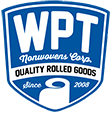 In the world of nonwoven product manufacturing, choosing the right materials is crucial for success. One option gaining popularity among manufacturers is the use of PLA (Polylactic Acid) Berry Amendment-Compliant MMF (Meltblown-Mask Filter) Nonwovens. These materials offer numerous advantages for product manufacturers, from sustainability and compliance to quality and performance.
In the world of nonwoven product manufacturing, choosing the right materials is crucial for success. One option gaining popularity among manufacturers is the use of PLA (Polylactic Acid) Berry Amendment-Compliant MMF (Meltblown-Mask Filter) Nonwovens. These materials offer numerous advantages for product manufacturers, from sustainability and compliance to quality and performance.
PLA Berry Amendment-Compliant MMF Nonwovens Offer Multiple Benefits in One Material
 In the world of nonwoven product manufacturing, choosing the right materials is crucial for success. One option gaining popularity among manufacturers is the use of PLA (Polylactic Acid) Berry Amendment-Compliant MMF (Meltblown-Mask Filter) Nonwovens. These materials offer numerous advantages for product manufacturers, from sustainability and compliance to quality and performance.
In the world of nonwoven product manufacturing, choosing the right materials is crucial for success. One option gaining popularity among manufacturers is the use of PLA (Polylactic Acid) Berry Amendment-Compliant MMF (Meltblown-Mask Filter) Nonwovens. These materials offer numerous advantages for product manufacturers, from sustainability and compliance to quality and performance.

